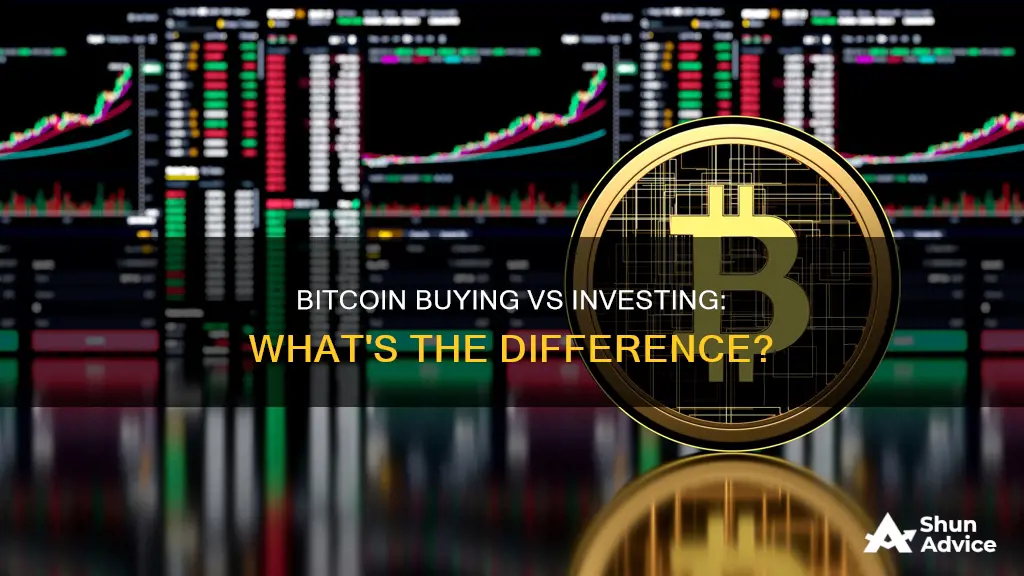
Bitcoin is a cryptocurrency with a short but volatile investment history. It was introduced in 2009 and has since become the most well-known and largest cryptocurrency in the world. Its popularity has inspired the development of many other cryptocurrencies.
Bitcoin can be purchased on several exchanges, such as Coinbase, Gemini, Kraken, Crypto.com, and others. It can also be bought through peer-to-peer money transfer apps like PayPal, Venmo, or Cash App, as well as through dedicated Bitcoin ATMs.
Before investing in Bitcoin, it is important to understand the risks involved, including regulatory, security, insurance, fraud, and market risks. As with any investment, it is recommended to consult with a financial professional to ensure it aligns with your financial goals and risk tolerance.
| Characteristics | Values |
|---|---|
| Purpose | Investment or medium of exchange |
| Risk | High |
| Volatility | High |
| Accessibility | Available at bitcoin ATMs or from payment services like PayPal and mainstream brokerage firms like Robinhood or Coinbase |
| Legality | Not protected by insurance from the Securities Investor Protection Corp. (SIPC). Legal status varies by location |
| Storage | Requires a cryptocurrency wallet |
What You'll Learn

Bitcoin wallets
There are several different types of wallets, each with its own features and levels of security. The main categories are:
- Custodial vs non-custodial: Custodial wallets are hosted by a third party that stores your keys for you. Non-custodial wallets are those in which you take responsibility for securing your keys.
- Hot vs cold: Hot wallets are connected to the internet or to a device that has an internet connection. Cold wallets are not connected to the internet and are considered more secure.
- Software vs hardware vs paper: Software wallets are applications for computers or mobile devices. Hardware wallets are physical devices, often resembling USB drives, that store your private keys offline. Paper wallets are simply pieces of paper on which private keys are written or printed.
Examples of popular software wallets include Trezor, Electrum, and Mycelium. Hardware wallets include Ledger and Trezor, while paper wallets are usually created by the user.
It is important to note that wallet safety is crucial as cryptocurrencies are high-value targets for hackers. Some recommended safety measures include encrypting the wallet with a strong password, using two-factor authentication, and storing large amounts offline.
Bloomberg's Bitcoin: Invest Without Buying
You may want to see also

Cryptocurrency exchanges
A cryptocurrency exchange is a platform that allows users to trade cryptocurrencies or digital currencies for other assets, such as fiat money or other digital currencies. They work similarly to a broker, giving users the tools to trade, buy, and sell cryptocurrencies like Bitcoin, Ethereum, and Tether. Some popular exchanges in the US include Coinbase, Kraken, Gemini, and Binance.
There are two main types of exchanges: centralized and decentralized. Centralized cryptocurrency exchanges are overseen by a third party (called an exchange operator), which helps to ensure that customer sign-up and trading runs smoothly. These platforms also make it quick and easy to link your bank account or debit card to buy crypto. However, this ease of access usually comes with fees to the exchange operator, on top of the asset purchase. On many centralized exchanges, investors can buy and sell digital assets with both fiat currency and other cryptocurrencies.
Decentralized cryptocurrency exchanges, on the other hand, lack third-party oversight, are open-source, and depend on peer-to-peer (P2P) trading. DEXs often require more technological skill and intimate knowledge of cryptocurrencies to use than centralized exchanges. Examples of decentralized exchanges include Etherdelta, IDEX, and HADAX.
It's important to use a reputable and regulated cryptocurrency exchange for your own safety. When choosing an exchange, it's essential to research accounts, key storage, wallets, security, user satisfaction, and features. Fees can add up, so make sure you understand how each exchange and blockchain charge for transactions.
The Ultimate Guide to Investing in Bitcoin Now
You may want to see also

Traditional stockbrokers
To buy Bitcoin through a traditional stockbroker, you will need to set up an account and connect it to your bank account, debit card or credit card. You will also need to provide personal identification information, such as a driver's license or Social Security card, as well as information about your employer and source of funds. The process is largely the same as setting up a typical brokerage account.
It is important to note that buying Bitcoin can be a risky investment, and it is generally recommended only if you have a high-risk tolerance, are in a strong financial position, and can afford to lose some or all of your investment. As a rule of thumb, it is advised not to invest more than 10% of your portfolio in risky assets like Bitcoin.
A Beginner's Guide to Investing in Bitcoin SV
You may want to see also

Bitcoin ATMs
The process for buying Bitcoin from a Bitcoin ATM typically involves the following steps:
- Enter the amount to purchase. Depending on local regulations and the amount being purchased, you may be required to verify your identity.
- Provide your Bitcoin wallet address by scanning the QR code of your Bitcoin wallet address using the ATM's camera.
- Pay using cash, credit card, or debit card.
- Receive the Bitcoin in your Bitcoin wallet. This generally takes a few minutes, and the ATM will provide a transaction ID to monitor the status of the purchase.
Some Bitcoin ATMs are bidirectional, meaning they can also be used to sell Bitcoin. The process for selling Bitcoin is as follows:
- Enter the amount to sell. As with buying, you may be required to verify your identity depending on the amount and local regulations.
- Send Bitcoin to the provided address by scanning the QR code of the provided address and sending the Bitcoin using your Bitcoin wallet app.
- Take your cash. Once the ATM receives the Bitcoin, it will dispense the cash, which generally takes a few minutes. You can monitor the transaction status using your Bitcoin wallet app.
There are approximately 31,000 Bitcoin ATMs and tellers across the United States, with the two largest networks being Coinhub and Coinme. Bitcoin ATMs can be found in various locations, including retail stores, shops, taverns, restaurants, malls, and airports.
While Bitcoin ATMs offer a convenient and accessible way to buy and sell Bitcoin, there are some considerations to keep in mind. Bitcoin ATMs have been criticised for charging high transaction fees, and they lack the protection provided by federal government regulation. Additionally, due to their anonymous and decentralised nature, they can be a frequent target for scams and fraud. Therefore, it is important to research potential fees, be wary of scammers, and only send money to trusted individuals when using Bitcoin ATMs.
A Beginner's Guide: Investing in Bitcoin with Luno
You may want to see also

Bitcoin exchange-traded funds
ETFs are investment funds that hold a collection of assets and issue securities as shares of the fund, which are traded on an exchange. Bitcoin futures ETFs use futures contracts to achieve their goal of offering exposure to Bitcoin's price movements. Fund managers purchase these contracts and bundle them into a fund.
The first Bitcoin-linked ETF was the ProShares Bitcoin Strategy ETF (BITO), which was approved by the SEC in October 2021 and is listed on the New York Stock Exchange. In January 2024, the SEC approved 11 Bitcoin spot ETFs, which hold Bitcoin as opposed to futures.
There are several advantages to investing in Bitcoin ETFs. They provide exposure to Bitcoin without the additional expenses and risks associated with owning and holding the cryptocurrency in a wallet. They also reduce the learning curve, as investors don't need to familiarise themselves with the technical aspects of crypto and can instead focus on trading. Bitcoin ETFs also offer more security, as there have been constant worries about the security of cryptocurrency exchanges, storage devices, wallets, and blockchains.
However, there are also some disadvantages and limitations to investing in Bitcoin ETFs. There is a risk of tracking error, where the ETF doesn't exactly match the underlying Bitcoin price due to management fees, transaction costs, or logistical issues. Regulatory uncertainty is another issue, as the regulatory landscape for cryptocurrencies is still evolving, which could impact the legality, trading, and valuation of Bitcoin futures. Bitcoin and Bitcoin futures can be highly volatile, and the leverage created by futures contracts can amplify gains and losses. Additionally, there is no direct ownership of the underlying cryptocurrency when investing in ETFs.
The Future of Money: Why Invest in Bitcoins?
You may want to see also
Frequently asked questions
There are several risks to investing in Bitcoin, including regulatory risk, security risk, insurance risk, fraud risk, and market risk.
Bitcoin has historically offered the potential for high returns. It is decentralised, and it has the potential to be a non-correlated asset, similar to gold.
You can buy Bitcoin on a cryptocurrency exchange, such as Gemini, Kraken, Coinbase, or Crypto.com. You can also use a traditional stockbroker like Robinhood, Webull, TradeStation, or Fidelity.







